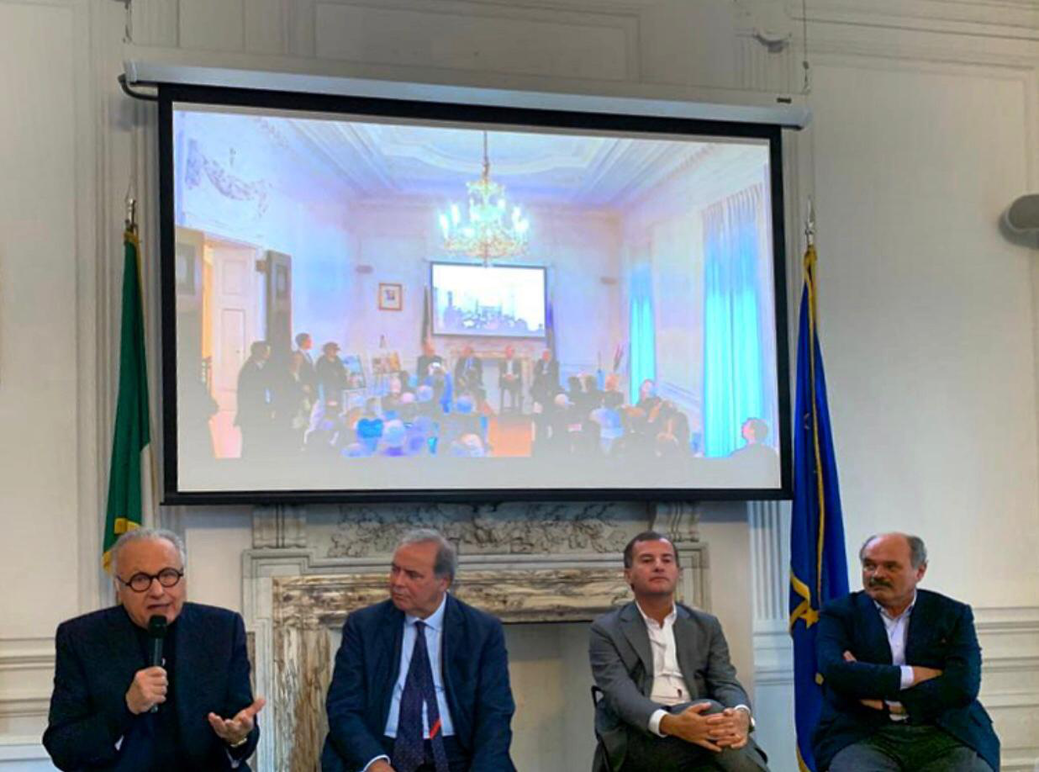Narrating the Italian Culinary Experience
“We Italians have an advantage, because thanks to our tradition we have the most beautiful and flavorful things. We are very good at this. But we have to put in a bit more marketing,” states Oscar Farinetti during the GEI (Gruppo Esponenti Italiani) round table held at the Consulate General of Italy in New York on ‘Contemporary marketing strategies for the Italian food and wine industry in the American market.’
The panelists are three known exponents of the Italian food and wine world in America: Oscar Farinetti, Italian entrepreneur and founder of the Eataly chain; Ugo Fiorenzo, CEO of Campari America; and Piedmontese wine producer and distributor Angelo Gaja of Gaja winery.
Moderating the conversation is Italian journalist and GEI President Mario Platero. Following the introduction by Consul General Francesco Genuardi, the three panelists engaged in an interesting conversation regarding the uniqueness of Italian products, each with their own identity, history, and unmistakable essence.
A product can’t speak for itself, it needs to be appropriatly communicated, it requires marketing and storytelling to truly reach the customer.
“Conveying Italianness,” the Italian experience. That’s the theme of the event.
Starting from the concept of identity, fully embraced by the Eataly brand, Oscar Farinetti poses a provocative question: “In the past, we were the greatest people, the Romans, we won every battle because we had the best athletes who ate the best food. During the Middle Ages, on the other hand, we were disastrous. We alternate generations in which Italians are sublime with others in which they are terrible. You be the judge, where does our generation stand?”
On the other hand, each generation is the product of its time. Ugo Fiorenzo explains this well as he talks about the success of Spritz, which is the eigth highest-selling cocktail in America with a growth rate of 22.5% on the American market.
“The Aperol Spritz phenomenon is incredible because there’s great storytelling,” Mr. Fiorenzo explains. “It’s a marketing phenomenon that cost us zero dollars: we just put Aperol Spritz in a white wine glass.”
Aperol was initially sold in Veneto at a very cheap price, it then landed in Milan, the capital of Aperitivo and finally spread across all of Italy. Fiorenzo tells us that in that moment, in order to succeed, they had to “sell the Spritz experience” and make it contageous. Putting it in a white wine glass created curiosity and buzz around the product, so that everyone would wonder “What’s that orange drink inside that glass?”
Another inspiring story about tradition and communication is that of Angelo Gaja and of his family. Gaja arrived in New York in 1974 when Italian wine came at a much lower cost.
“Wine was a staple drink and as such it had to be as accessible as milk or bread. However, I was offering a wine from Piedmont, with a name and a much higher price.” And how did he gain success? By pairing wine with food, thus exalting the food itself. He started working in Italian restauration, which is always growing in the US and was able to immediately gain free visibility, by having his wines on restaurant menus.
Today, you certainly need a much more aggressive and complex marketing strategy to secure a space at the top of the pyramid.
“I come from a family of wine artisans and I consider myself an artisan,” Gaja affirms. “No other alchoholic beverage in the world has the culture that wine has. You have to be able to tell it and present it the right way. Fostering artisanal production is important because it’s a unique heritage. The market appreciates difference and we are highly diverse.”
Unafraid of competition. Uniqueness always wins. And, speaking of other businesses with apparently the same format as his, Oscar Farinetti says “I’m not afraid of the competition because I have a great advantage compared to others: I have Italian cuisine on my side, on our side. A cuisine invented by our grandmothers and great-grandmothers. Other cuisines were invented by chefs and are certainly extraordinary, but they’re not replicable at home.”
And in the end they all agree: ‘made in Italy’ - with its history, its culture, its attention to detail and commitment to the artisanal approach to production - is and remains stronger than the 25% tariffs that starting this week will penalize the import of Italian cheeses and spirits to the US.











































i-Italy
Facebook
Google+
This work may not be reproduced, in whole or in part, without prior written permission.
Questo lavoro non può essere riprodotto, in tutto o in parte, senza permesso scritto.